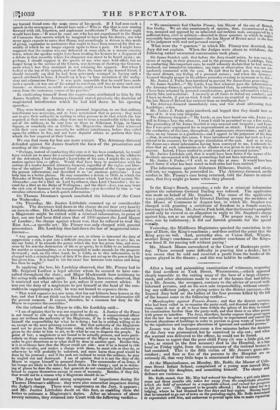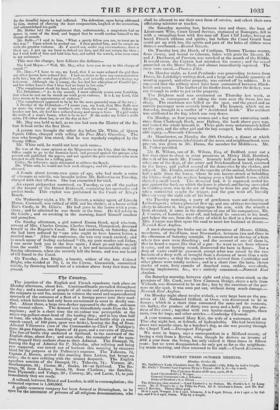After a long and painstaking examination of witnesses, respecting the
fatal accident in York Street, Westminster,—which appeared clearly traceable to the cutting away of the base of a large chimney- stack, and other alterations made in one of the houses that had fallen, by a Mr. Jesson, the occupant, contrary to the advice of several well- informed persons, and on his own sole responsibility, without consult- ing any sufficient judge, or giving notice to the district surveyor,—the Inquest Jury held on the bodies of the four persons killed by the fall of the houses came to the following verdict-
" _Manslaughter against Francis .Tesson ; and that the district surveyor, who had been called in to examine the party-wall, and directed sundry repara- tions, states it not at all to have been within the sphere of his duty to extend his examination further than the party-wall, and that there is no other person with power to interfere. The Jury, therefore, hereby express their great regret that the law has not empowered some authority to superintend and control the internal alterations of buildings in order to prevent so great waste of human life by the injudicious and improper alterations of ignorant and unskilful persons."
Jesson was in the Inquest-room a few minutes before the decision of the Jury was pronounced, but he contrived to slip out; and when the warrant was delivered to the officer, he could not be found.
We have to regret that the poor child Perry (it was a little girl, not a boy, as stated in the first account) died in the Hospital, at a late hour on Friday night, from the consequences of the internal bruises it had sustained. This is the fifth victim of Mr. Jesson's gross mis- conduct ;and four or five of the persons in the Hospital are so seriously ill, that very little hope is entertained of their recovery. At the Mansionhouse, on Monday, Mr. Rolfe, the Master of Cole- man Street Infant School, complained of a young man named May, for seduting his daughter, and assaulting himself. The charge and defence are curious— Mr. Rolfe stated, that Mr. May had seduced his daughter, a girl only fifteen years and three months old, taken her away from the conzfortable situation which she held of assistant in a respectable school, and ruzned her prospects in life for ever. [He appeared to be greatly affected.] He had taken her to 32 lodging, where he had detained her four days and four nights. Having heard that he intended to go out of town on the preceding night, Mr. Rolfe determine to expostulate with him, and endeavour to prevail upon him to make reparatioa
for the dreadful injury he had inflicted. The defendant, upon being addressed by him, instead of showing the least compunction, laughed at the accusation, and acknowledged his guilt. Mr. Hobler told the complainant that, unfortunately, a magistrate had no power in cases of the kind, and begged that he would confine himself to the charge of assault.
Mr. Rolfe-‘-" I said to him, What a pretty fellow you are, to treat me in this way !' Upon which he pushed me. I then pushed him, arid he struck me with the greatest violence. As I wo2dd not, under any circumstance, have a black eye, I put up my hand to defend my face, and did not return the blow ; but I took hold of him and held him fast, and called the watch, who $0011 came to my assistance."
This was the charge ; here follows the defence—
The Lord Mayor—" Well, Mr. May, what have you to say to this charge of assault?"
Mr. May—" I have to say, my Lord, that I no more seduced the girl than any other person here seduced her. I had no desire to have any communication with liar; but she scaled my fidher's walls, and actually wanted to besieye my bed-room. Although she is young, she has had her education at Cambridge; and her father knows that I have had no hand in her ruin."
• The complainant shook his head, but sail nothing.] The Defendant—" As to the assault, I most solemnly assure your Lordship, that when he met me he struck me with great violence. It is I, my Lord, that have reason to be apprehensive of violence." [The complainant appeared to be by far the more powerful man of the two.]
A Brother of the Defendant—" I assure you, my Lord, that Miss Rolfe was no more the victim of my brother's arts than she was of mine. Before my brother saw her, she had been seduced many and many a time, if a girl scales the walls of a man's house, what is he to do ? If she scales my father's walls again, I'll either shoot her, or set the dog at her."
Mr. May was held to bail, as no one had seen the Master of the In- fant School strike the first blow.
A person was brought the other day before Mr. White, of Queen Square Office, charged with selling the Poor Man's Guardian. The man who brought him stated, that -he was regularly employed by the Stamp Office. Mr. White said, he would not hear such cases—
He was of the same opinion as the Magistrates in the City, that the Stamp Office ought to go to the fountain-head, and proceed against the persons who printed and published the papers, and not against the poor creatures who were tempted to sell them for a trifling gain. Colley, the informer, again attempted to address the Bench.
Mr. White said, he would not hear such charges; and the prisoner was dis- charged.
A female about twenty-two years of age, who had made a series of attempts at suicide, was brought before Mr. Ballantine on Tuesday, charged with that offence. She was committed for trial.
An expert pickpocket contrived, on Tuesday, to cut off the pocket of the keeper of the Bristol Bridewell, containing his spectacles mid pocket-book. This exploit was performed in the Court of King's Bench.
On Wednesday night, a Mr. W. Bennett, a mining agent, of Lincoln Horne, Cornwall, was robbed of 600/. and his clothes, at a house called Rat's Castle, in St. Giles's. He had gone to the house with a pros- titute; and he admitted he was drunk at the time. He fell asleep in the Castle ; and on awaking in the morning, found himself coatless and pennyless.
On Sundaf afternoon, a girl named Emma Good, aged nineteen, servant of Mrs. Charles Groom, Charles Street, Hampstead, drowned herself in the Regent's Canal. She had confessed, on Saturday, that she had been seduced by "one who ought to have known better, a married man." After the confession, she was very much excited ; and in much agony of feeling exclaimed "Oh, my poor mother and father, I can never look you in the face again ; I must go and hide myself from the world." She continued in a low and inconsolable state till Sunday afternoon, when she secretly left the house, and was not heard of till found in the Canal.
On Tuesday, Ann Bright, a lunatic, widow of the late Colonel Bright, who resided at No. 1, in the Circus, Greenwich, committed suicide, by throwing herself out of a window above forty feet from the ground.




















































 Previous page
Previous page